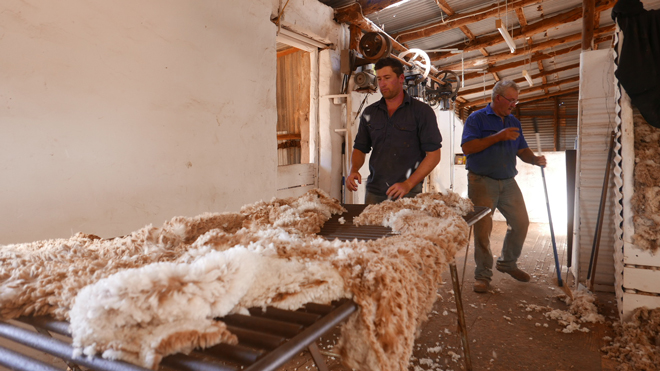Traceable wool from the family farm

Woolgrower Jonathan Byerlee of Wyndhurst Estate on the eastern side of the Flinders Ranges also runs a knitwear brand that uses Merino wool that is fully traceable all the way from his family’s historic farm through to the final knitted products.
The founder of Wyndhurst Knitwear, Jonathan Byerlee, with his father Brenton.
Woolgrower Jonathan Byerlee of Wyndhurst Estate on the eastern side of the Flinders Ranges also runs a knitwear brand that uses Merino wool that is fully traceable all the way from his family’s historic farm through to the final knitted products.
The story of Wyndhurst began with one of Jonathan’s ancestors, John Fisher, when the Orroroo district of South Australia was settled in 1876.
John Fisher had planned to move his wife Susannah and children to the farm at Eurelia, but he tragically died of exhaustion just after building his house on the property. Despite the hardship, Susannah had little choice but to go ahead and still move to the farm 320km away, on horse and cart with their nine children...
Nearly 150 years later, the Wyndhurst Estate at Eurelia, which nowadays is a quick four hours’ drive north of Adelaide, is home to Susannah and John’s sixth generation descendants. Jonathan Byrlee farms the 1,100-hectare property, running 650 SRS Merinos with 17.5-micron wool. Jonathan follows organic farming principles, with the property’s soil health maintained with no synthetic chemicals or fertilisers.
Respecting the past and the future
To create an additional income stream for the business, in 2020 Jonathon set up Wyndhurst Knitwear, a brand which is inspired by the generations of Byerlees who have lived and worked on the property.
Jonathan says every product stays true to the simplicity and elegance of a bygone era, blending the vintage with the contemporary.
“Wyndhurst Knitwear is truly Australian and represents the hardworking farmers of the land, a homage to slow fashion, ecological awareness and great style,” Jonathan explained.
“When establishing the brand, we took a stand to return to the quality and craft that so many of us value and love. Our garments are made to last for generations not just one season.
“We offer high-quality, stylish and practical knitwear products – jumpers and scarves for men and women – that are produced entirely within Australia and New Zealand.”
Importantly for Jonathan, all the brand’s wool is sourced directly from the family farm.

Wyndhurst Knitwear’s range currently comprises jumpers and scarves made using Merino wool from the Byerlees’ family farm.
“Our traceable supply chain journey begins with our beloved Eurelia soil and sheep in our heartland of South Australia. It travels to the Macedon Ranges of Victoria for processing, before being spun into yarn in New Zealand, and then knitted into garments with beautiful stitch structures and sophisticated detail by Knovus in Melbourne,” Jonathan said.
“The short distance of our supply chain enables our clothing to have a low carbon footprint and the full visibility of the supply chain allows us to ensure best practice across every process.
“We are this year also starting to supply other clothing companies with our fully traceable yarn.”
Eco-friendly seamless knitting technology
The Wyndhurst Knitwear jumpers are knitted completely whole, using the latest in innovative Shima Seiki 3D seamless knitting technology.
“By knitting our garments whole, we remove seams to increase comfort for the wearer,” Jonathan explained.
“3D knitting also removes waste in garment construction, and allows us to produce in small batches to satisfy demand only, thereby eliminating any surplus production stock.”
It’s technology that the past generations of women of Wyndhurst Estate that knitted for the family wouldn’t recognise. But they would certainly recognise the brand’s colour palette, drawn from the Wyndhurst Estate and reflecting the rich burnt orange of the soil, deep greens of the shrubs and eucalypts, and moody greys of the rare stormy skies – colours that have been present there for generations.
More information: www.wyndhurst.com.au
This article appeared in the June 2023 edition of AWI’s Beyond the Bale magazine. Reproduction of the article is encouraged.












